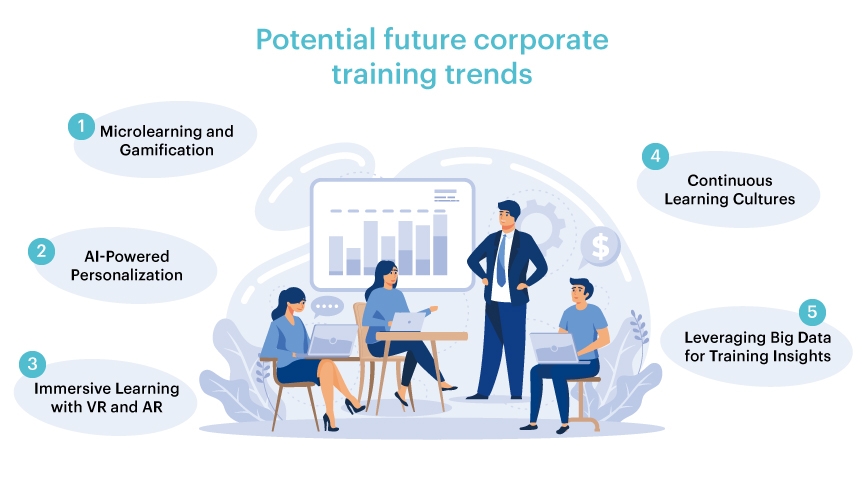Meetings
The Future of Corporate Training (Blending Technology with Traditional Space?)
Shyam Nagarajan / Reading Time: 4 mins
The landscape of corporate training has undergone rapid evolution, accelerated even further by the remote work shift driven by the pandemic. While virtual training offers immense benefits like broad accessibility, organizations still recognize the value of in-person elements for impactful development and relationship building. The future of effective corporate training lies in blended models that leverage technology while retaining traditional physical spaces and interactions.
In this article, let’s discuss the significance of blended training and potential trends of corporate training in the future.
Past & Present of Corporate Training
Historically, corporate training has been characterized by face-to-face interactions, with a strong emphasis on personal communication and direct supervision. Traditional methods such as classroom-based learning, workshops, and printed manuals have been the backbone of employee development programs.
These approaches have excelled in creating environments conducive to hands-on learning and real-time feedback. However, they often fall short in scalability, flexibility, and personalization – aspects increasingly critical in today's fast-paced and diverse work environments.
The advent of digital technology introduced e-learning platforms, online courses, and virtual simulations, offering unprecedented accessibility and convenience. Despite these advancements, many digital training initiatives have struggled to replicate the engagement and effectiveness of in-person experiences. They frequently overlook the importance of social interaction and the nuanced dynamics of face-to-face mentorship and collaboration.
As a result, while technology has expanded the reach and efficiency of corporate training, it has also highlighted a gap in creating genuinely comprehensive learning experiences that leverage the best of both worlds.
Future of Corporate Training
The future of corporate training lies in a harmonious integration of technology with traditional training spaces, crafting a blended learning ecosystem that leverages the strengths of each approach. This synthesis aims to provide a more rounded, engaging, and effective training experience that meets the diverse needs of modern learners.
The key to successful integration is the strategic use of digital tools to enhance, rather than replace, traditional training methods. For instance, virtual reality (VR) and augmented reality (AR) can offer immersive learning experiences that are difficult to achieve in a conventional classroom setting. These technologies can simulate real-world scenarios, allowing learners to practice skills in a safe yet realistic environment.
Similarly, artificial intelligence (AI) can be utilized to personalize learning paths, providing each learner with a customized training experience based on their unique needs and learning pace.
Adopting a hybrid learning model is essential, where online and digital resources complement in-person training sessions. This approach allows for the flexibility and accessibility of digital learning while preserving the interpersonal interaction and hands-on practice of traditional methods.
Incorporating collaborative tools and platforms can foster a sense of community and enable peer learning and support, even in a digital space. Continuous feedback mechanisms, facilitated by technology, can help trainers and learners alike to monitor progress and adapt learning strategies in real-time.
In analyzing potential trends for corporate training in the future, here are some key insights.
- Microlearning and Gamification
One trend gaining momentum is microlearning, where training content is delivered in small, manageable chunks that are easier to digest and retain. When combined with gamification elements, such as points, badges, and leaderboards, microlearning can significantly boost engagement and motivation.
- AI-Powered Personalization
AI technologies are set to revolutionize corporate training by offering highly personalized learning experiences. By analyzing learners' behaviors, preferences, and performance, AI can tailor content, suggest resources, and adjust difficulty levels in real-time, ensuring that each learner's path is optimally challenging and rewarding.
- Immersive Learning with VR and AR
Immersive technologies like VR and AR are poised to become more prevalent, providing experiential learning that can replicate complex scenarios or procedures without the associated risks. These tools can enhance learning outcomes, particularly in fields requiring hands-on expertise or situational awareness.
- Continuous Learning Cultures
Organizations are increasingly recognizing the value of fostering a culture of continuous learning. This involves integrating learning into the daily workflow, encouraging employees to dedicate time to personal and professional development regularly. Technology plays a crucial role in facilitating this by providing accessible learning opportunities tailored to individual needs and schedules.
- Leveraging Big Data for Training Insights
The use of big data analytics in corporate training can offer deep insights into the effectiveness of training programs. Upon analyzing large datasets, organizations can identify patterns, measure impact, and make data-driven decisions to optimize training strategies and improve ROI.
Final Thoughts
Corporate training has undergone an evolution from solely place-based learning to remote digital access. However, exclusively virtual training has limitations. The future lies in blended models that thoughtfully fuse physical and virtual elements to provide the best of both environments.
With the flexible integration of spaces, technology, and facilitation techniques, organizations can create truly engaging, effective development while also retaining invaluable human connections.


